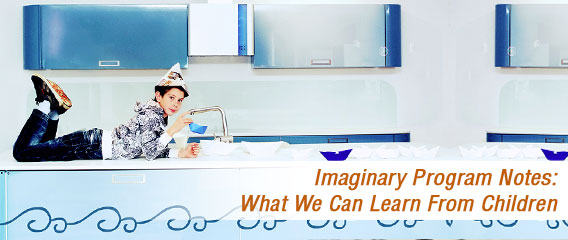There is a point in every adult life where we miss being children. We occasionally long for the freedom of unbinding imagination where anything is possible. We miss the unstructured play time, the long carefree days of no responsibility, and the sense of endless time.
Visiting my brother’s family this past weekend there was a point where I realized I missed being a kid.
“Let’s play My Little Pony!” my niece said. “How do you play that?” I’d asked. It was the dismay in her eyes that gave the answer she didn’t have to verbalize: There are no rules, you just play. Duh.
After an afternoon of playing with my niece it was time to go to my brother’s concert. I went back to being an adult. My adult night consisted of getting my tickets, sitting dutifully in my seat, reading the program notes, and applauding in all the right spots. The first piece on the program was unfamiliar to me, Henze’s Suite from the opera “Die Bassariden”. It intrigued me so much I decided to return the following night to get a second listen. Because, I figured, that’s what responsible, music loving, reflective adults do.
So the following evening I returned to the Kennedy Center to absorb the Henze one more time. After I found my seat I watched a family take their seats in front of me; a husband, wife and their two children about age five and six.
I wondered how these children would react to the Henze. How could they enjoy this piece without understanding what the composer wanted the audience to feel or think. I sarcastically thought: these poor kids probably didn’t even have a general idea that this composer was influenced by serialism and atonality, tragic.
The 23 minute work started off with random woodwind and horn solos creating intangible themes that wove in and out of a fog of ambiguous shimmering strings. I watched just about every adult in the concert hall share a collective and unified sigh as they wrongly assumed the whole 23 minutes would continue with this vague and tiresome challenge to the ears.
Thankfully, the kids in front of me were not squirming too much, not like some of the adults around them.
As the Henze proceeded through various captivating moments, the kids reacted in the most refreshing ways. For instance, after a giant surprising chord, the boy turned to his sister and mimed a bear growling with its claws in the air. She silently giggled and feigned terror, putting her hands over her mouth in a dramatic response.
The next day I decided to play some music for my niece to see what she had to say. First up, Stravinsky’s Rite of Spring; I played a small segment from the loudest and most exciting part of the piece. I figured she’d find it scary, terrible, and violent since that’s basically how many people reacted 100 years ago when they heard it. Instead she told me she heard “courage” and proceeded to tell me what she thought the music represented to her.
Then I played a short movement from Elgar’s Enigma Variations. She found it to be funny because, “It sounds like kids chasing and sneaking up on each other, playing hide and seek.”
Watching these children’s experiences while listening to various pieces made me remember that sometimes music is simply to be played and listened to. Duh. While program notes offer general historical knowledge of any given piece and can enhance an audience member’s enjoyment, sometimes freeing one’s self from the restrictions of the program notes and history allows the basic purpose of music to affect us. Music evokes an emotion and there is no “correct” way to feel or understand it.
So, have some fun with your children, play some music and let them decide what the story is. Ask them to share what and how the music makes them feel. Have them draw a picture of what they think the music should look like. And if you feel inspired by what the children have imagined or created as a result, please share the music that was played along with the story or art by leaving a comment or sending an email!
Post Script
At the National Symphony concert, many of my friends performing that evening were shocked that I’d enjoyed the Henze, and more shocked I wanted to hear it again! I knew exactly where they were coming from; it’s the type of piece that requires immense focus on individual parts, and there can be a tendency to lose sight of how the big picture comes across.
There is also the fear that, while you’ve had a week to learn and get to know the music, the audience will not have the same luxury and leave the concert underwhelmed or unappreciative.
The second evening I sat with the musician’s families, proud parents and spouses. One of the parents informed me that their daughter was sure the Henze would not be received well. This sounded utterly familiar since I’ve issued the same warning a number of times to my own parents over the years for countless pieces. (Note to self: stop telling my parents what to think, and encourage them to observe their emotional reactions to the music instead!)











great article! It gave me some ideas for future projects! 😉
Thanks! I’ll be curious what you come up with and hope you share!
Exactly! There is so much we can learn from children’s views. This gives the concert goers so much more ownership and meaning to their own experience experience.
Great article… 🙂 How we all envy those children… 😀